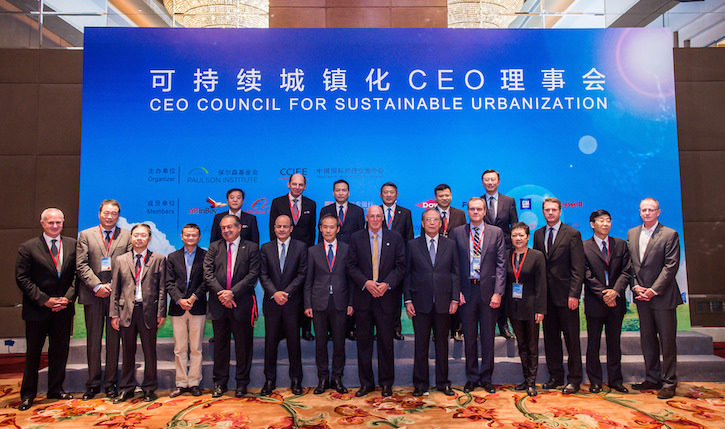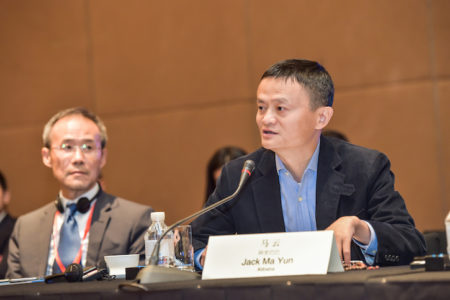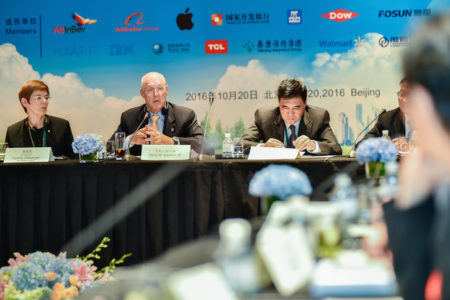
The Paulson Institute today co-hosted, together with the China Center for International Economic Exchanges, the third annual meeting of its CEO Council for Sustainable Urbanization. Council members concluded a successful second year of collaborative projects to reduce energy and resource use and help build more sustainable cities in China. Additionally, the Council ratified an agenda for its work in the year ahead and welcomed an 18th member in Wanxiang CEO Lu Weiding.
 During the meeting, the CEOs pledged to continue work toward the Council’s mission, which is to harness the collective impact of leading U.S. and Chinese corporations to find concrete, sustainable solutions to urbanization challenges in China. Over the past year, the Council has broadened its focus beyond Green Buildings to work together on projects that integrate green technologies and products into large-scale, regional developments. The Council also launched green supply chain initiatives, focusing on reducing energy use in the member companies’ global supply networks and managing forestry resources sustainably to avoid deforestation that contributes to climate change.
During the meeting, the CEOs pledged to continue work toward the Council’s mission, which is to harness the collective impact of leading U.S. and Chinese corporations to find concrete, sustainable solutions to urbanization challenges in China. Over the past year, the Council has broadened its focus beyond Green Buildings to work together on projects that integrate green technologies and products into large-scale, regional developments. The Council also launched green supply chain initiatives, focusing on reducing energy use in the member companies’ global supply networks and managing forestry resources sustainably to avoid deforestation that contributes to climate change.
“This year, the United States and China have shown real leadership in reaching a historic agreement to transition to low-carbon, climate-resilient economies, which will require businesses to do their part to drive decarbonization. I am pleased to see our U.S. and Chinese CEO Council members coming together to demonstrate leadership in this way. Through our efforts we can help build business ties between the U.S. and China – and contribute to solving environmental and sustainability challenges,” said Henry M. Paulson, Jr., chairman of the Paulson Institute.
 As the Council enters its third year, members are working together on a number of “Sustainable Cities” projects proposed by China State Construction and Engineering Corp., CDB Capital, and IBM, ranging from full-scale green townships to suburban developments and potential low-carbon projects in the city of Zhangjiakou. At the meeting, China Development Bank and Honeywell signed an MOU agreeing to work together on deploying green technologies into CDB Capital’s projects.
As the Council enters its third year, members are working together on a number of “Sustainable Cities” projects proposed by China State Construction and Engineering Corp., CDB Capital, and IBM, ranging from full-scale green townships to suburban developments and potential low-carbon projects in the city of Zhangjiakou. At the meeting, China Development Bank and Honeywell signed an MOU agreeing to work together on deploying green technologies into CDB Capital’s projects.
The Council’s foundational work this year on greening supply chains included sharing best practices among Council members as a first step toward members committing to improve their own practices going forward. Walmart highlighted its work to help suppliers in China maximize energy and resource efficiency and hosted a visit for Council representatives in July to a supplier’s factory in Shenzhen to see this work in action. Apple and Vanke shared with the Council their work, respectively, around sourcing and usage of forestry materials for their paper and timber products. Further, the Council released white papers exploring challenges, opportunities, and models on both resource efficiency and forestry products.
“This Council brings together U.S. and Chinese companies to work together with the government to solve environmental and development challenges, and such collaboration will make a significant contribution to helping to achieve our sustainable urbanization goals,” said CCIEE Chairman Zeng Peiyan.



